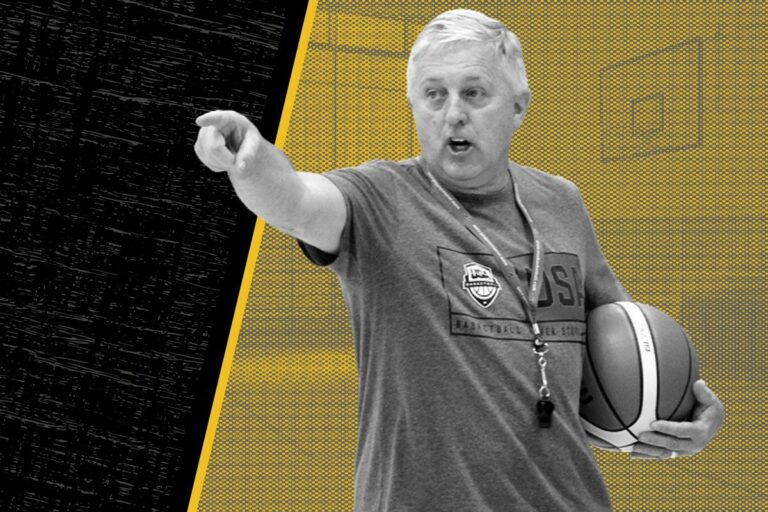Kevin Broene’s 5 Leadership Lessons FROM Ted Lasso
- Being a complete and impactful leader will require you to step out of your comfort zone, and take different approaches to different situations.
- Even if you do things the right way, thing’s won’t work out 100% of the time. That doesn’t mean you did something wrong.
- Be receptive to new ideas and approaches, and try to find new ways to build off old ideas.
In just two seasons, Apple TV+’s Ted Lasso has established itself as one of the best shows out, largely because of its writing, themes, and generally uplifting, wholesome tone. Jason Sudeikis portrays the kind and optimistic coach Ted Lasso as he navigates being a professional soccer coach with no soccer experience. Throughout this cheery journey, coach Lasso shares several leadership lessons that have real-world applications.
With almost 20 years of coaching experience to his name, Kevin Broene can vouch for this fact. In addition to his professional experience, coach Broene also is the founder of Grit Leadership for Educational Athletics, a leadership program that utilizes tools and anonymous feedback to help leaders develop and improve.
Drawing on all this wealth of experience and knowledge, Broene identified five leadership lessons from Ted Lasso that inspired him to think differently about leadership, and helped him elevate his students.
This scene from the series premiere sets the tone for both the entire show, and Broene’s lessons going forward. Through a simple question, “would you rather be a panda or a lion,” a clear dynamic is defined between coach Lasso and his boss, team owner Rebecca Welton.
“So here we have the basic characteristics of the lion and the panda,” Broene says. “We look at this lion, aggressive, strong, fierce, powerful, majestic, feared, out front, sure of themselves — no doubt about what they’re saying. And that’s a style of leadership that is often valued in our country, this upfront powerful leader who’s always right.”
On the other hand is the panda, which generally is associated with being gentle, mild, peaceful, soft. These traits present opposite approaches to leadership that are both valuable, but may not paint a complete picture. Instead, as coach Lasso replies, “can I be an elephant?”
Broene observes that elephants have the best of both worlds. “Strong, durable, and determined from the lion side, loyal and nurturing from the panda side. Both are powerful protectors of their pack. So you can see that this is a much more complete version.”
“Lions don’t typically attack herds of elephants. They’re too strong, too big,” Broene explains. “They’re too hard to get at…they won’t go after that elephant. So if the lion is said to be the king the best, but they don’t take on the. Who’s really the king?”
So to “be the elephant,” leaders will have to tap into traits that don’t always come naturally. Those who identify as lions will have to learn to be gentler and more caring like the panda, while pandas have to be more strong and confident like the lion.
Talking about this requirement, Broene says, “We can all be a little bit better and a little bit different than we currently are, If we try to work at it.”
After one of his players makes a mistake and gives up a goal in practice, Lasso calls him over to talk to him. Instead of berating him or explaining what he did wrong, he just asks, “You know what the happiest animal in the world is?” The answer? “It’s a goldfish. It’s got a 10 second memory.” Lasso tells his player to be like a goldfish, and sends him on his way.
Broene interprets this as saying, “in the moment, we have to forget the past and move on…I don’t disagree with it, but I’m not sure if I fully agree with it either.” He continues, “We need to forget what happened in the last moment so we can be our best in the next moment. But also we have to be careful not to be the bass. Third space leaders avoid being the bass by helping build a culture of reflection within their team.”
To illustrate his point, Broene told us about his daughters fishing. Each time Broene or his daughters catch a smaller fish, they know they can get a much bigger bass to bite on the smaller fish. They use this strategy over and over and each time it works to great effect.
“If we only live like a goldfish, I think that we risk becoming the bass, because that bass, he was surprised every single time we caught him. If he was any smarter, we’d have to do something different,” Broene notes.
“I don’t want you to have a team full of people that keep making the same mistakes over and over again cause you teach them to be a goldfish. Don’t forget to teach them to not be the bass. Learn to cultivate the culture of reflection within your team so we can move onward and we can move forward stronger and better than we were before.”
At Leading Edge we also recognize the value of having a team where the members help each other. That’s why we invite you to join our community of leaders and subscribe to our newsletter: The Edge. Get real, first-hand stories and tips from expert leaders about how they’ve built successful programs in different communities, delivered straight to your inbox every month, by signing up today.
In season two, when faced with new challenges and a deteriorating situation, coach Lasso brings out his alter ego, “Led Tasso,” who is more aggressive, intimidating, and resorts to punishing players. Broene admits this is a moment he can relate to.
“I’m really not proud of it, but I do have a life that I’ve lived and a story that I tell. I’ve kicked basketballs across the gym more than one time. I’ve broken clipboards in anger and frustration to try to prove a point, or let teams know that I’m more serious.”
From time to time, particularly in sports, leaders can get into this “might makes right” mode — either intentionally or not.
Broene continues, revealing, “one of the things I didn’t show you in the clip at the end is, at the end, there’s a sports psychologist in season two who’s sitting in the stands watching all of this…She says, ‘does that ever work?’ And they kind of look at each other, trying to really think of a time that it actually worked.”
Indeed, trying to lead by force and with negative energy rarely, if ever, gives you the results you’re looking for.
To be more like the elephant from earlier, Broene says, “we have to realize, if we’re gonna be those wise leaders, is that we might do the right thing a lot of times and it doesn’t work out. That doesn’t mean it’s the wrong thing.” Instead, approach situations with positivity.
This doesn’t necessarily mean smiling and laughing even when things aren’t going great, however. Positivity means acknowledging the situation, good or bad, and only identifying helpful, constructive things.
Referring back to the lion-panda dichotomy, Broene says, “We often exercise what’s natural to us. As a panda, that’s kind of stepping back and letting things happen and just saying, ‘ we stink today.’ As a lion, it’s getting frustrated, becoming Led Taso. It’s that third option that we can get to, to give everyone a chance. And that’s our job as the leader, is to give people the chance to be better.”
In one of the most beloved scenes from the show, Ted faces off in a game of darts with Rupert, the ex-husband of Rebecca and newly-minted minority owner of AFC Richmond. It’s a great moment in the show, because of the lesson it teaches: Be curious, not judgemental.
Broene explains, “the most successful companies are companies that have found known quantities, gotten creative, asked questions, and built new ideas based off of those known ideas.”
“The whole thing is that we have to be curious. We can’t pretend that we already have it all figured out. We have to be curious. We have to be people that are willing to learn, willing to listen, willing to grow, willing to do something different, to be creative.”
We don’t want to spoil the results of the darts match, but anyone who’s seen the clip knows just how helpful asking questions could ultimately be.
Defining what, for you, would be a successful year is a vital first step for any program. Through his Grit Leadership platform, coach Broene has a unique insight into this very topic.
“What does it mean to be successful in your sport, in your company? In your leadership role? When I talk to groups, or schools, or whatever it may be, I get a lot of the same answers. And, what’s really interesting, is that the first answer that comes out is never, ‘success is about winning.’ The money or the winning is maybe sometimes a byproduct of that, but it’s never the reason why.”
This lines up perfectly with another of Ted Lasso’s more profound moments. During a dinner between coach Lasso and journalist Trent Crimm, Lasso echoes Broene almost word-for-word. “To me success is not about the wins and losses. It’s about helping these young fellas be the best version of themselves, on and off the field.”
Broene also notes that, “instead of asking yourself what you think success is, what would your team say you think success is? It says a lot about how you’ve been leading, right? Your players, what would they say?”
How you handle situations where your view of success has not been reached also matters greatly. When his team ultimately comes short of their goals, Ted Lasso keeps his positive mindset and encourages his players to hold their heads high.











